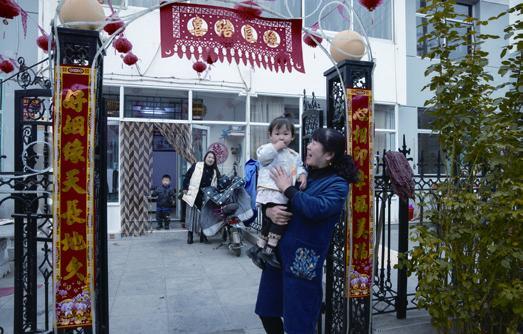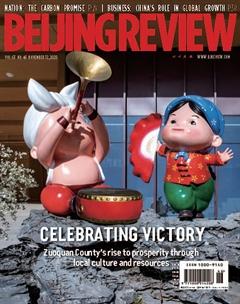MOVING FOR IMPROVING
By Ma Li
Zhou Xinfang considers 2017 to be a year of “earth-shaking change” for her family. It was the year the family moved from their remote village in Zuoquan County, Shanxi Province in north China, to a more hospitable area. From a draughty, adobe house they relocated to a modern apartment with all the amenities they had lacked before.
The old village, hidden in the mountains, lacked running water, transport, schools and hospitals. But the new resettlement site, built in 2003, is more centrally situated.
“In the past, we had to get water from faraway places, but now we get water by turning on the tap,” Zhou said.“My grandson had to walk an hour to school, but now we have a kindergarten and primary school nearby; and it takes 10 minutes to go to the hospital.”The icing on the cake is the extra stable income. With her husband, son and daughter- in-law working in the city, she had to struggle with the cattle. But now the animals have been handed over to a farmers cooperative and fetch a handsome extra income.
As the poverty alleviation campaign in the county accelerated, over 4,500 impoverished people from 32 villages had been relocated by the end of 2018, according to Ju Weirong, Director of the Poverty Alleviation Office of Zuoquan.
Bai Yanfang lives next door to Zhou. In the past, her four-member family struggled to live on the sparse income from her husbands salary as a government employee and the little plot of land they had in the mountains, where they grew corn and potato.
Bai said they worried what would happen if someone fell ill as they had no savings to pay for medical expenses. “We would hope that one day we too could live like people in cities do. That in winter the children would have warm classrooms without freezing.”The relocation in 2007 brought good luck for Bais family. Her son got a good job in Inner Mongolia Autonomous Region in north China, married and is now a proud father with two children. Her daughter got married from the new house in October and to top it all, Bais husbands salary has been raised. Also, they have medical insurance.
Last year, the per-capita income of Donggou, the village where they have relocated, was 8,600 yuan ($1,287). This year, despite the novel coronavirus epidemic, it has crossed 10,000 yuan ($1,497), Wang Zhiming, Secretary of the Communist Party of China Donggou Village Branch, said.
To ensure the villagers livelihood after relocation, various programs have been started. The villagers grow walnuts, a specialty of the county, and multiple crops. Cattle raising is also a major household business. A waxberry industry is being developed with an investment of 2 million yuan ($299,585).

